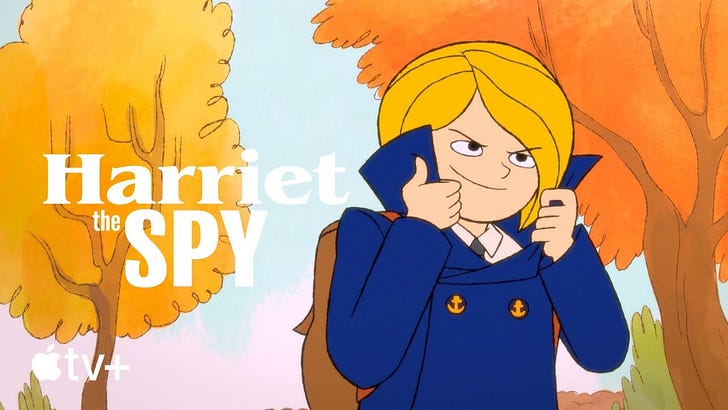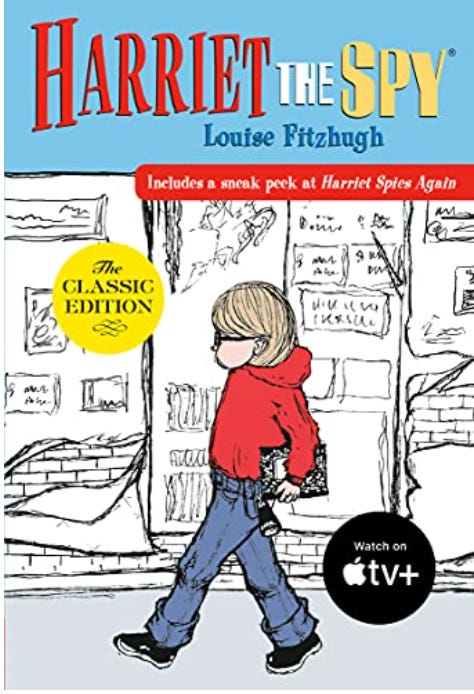Harriet the Spy (2021), The Sex Lives of College Girls & Kamikaze
On the surface, all of these shows feature strong, bold female protagonists but that's where the similarities end
Harriet the Spy landed on Apple TV+ on Friday, November 19th. All 5 episodes are available now for consumption. Voiced by Broadway and tv/film star (Impeachment: American Crime Story, Booksmart, Lady Bird) Beanie Feldstein, Harriet is not over-the-top charismatic. Instead she’s forever curious, never fearful of following a lead, and has razor-sharp focus when it comes to her ability to document the object of her curiosities. In short, she’s a real girl who makes no apologies for her drive, even when it gets her in awkward situations. In the first episode, Harriet’s object of intrigue is the reclusive Agatha K. Plumber who Harriet investigates with the hope of discovering why she won’t leave her apartment.
Harriett is messy (her bangs never perfect) and brash and says what’s on her mind and in the course of her literary age (57), she’s been deemed at times, a persona non grata, with her brand of being often interpreted and met with varying forms of derision based on societal convention.
Take the following as an example:
Harriet the Spy was challenged in 1983 at a school board meeting in Xenia, Ohio, where some argued the book encouraged children to disrespect their parents by lying, talking back, cursing, and spying on others. ... Psychologists called it “too dark”, and the book was banned largely in the south.
As a personal aside, it should be stated for the record that any children’s book worth reading was likely banned at some point. (The Lorax, The Giving Tree, A Wrinkle in Time, to name a few)
The criticism met by Louis Fitzhugh, the author of Harriet the Spy (1964), was hardly surprising. The ‘80s was an era marked by a pendulum shift back to a more conservative America following the liberal leanings of the 60s and late 70s and the events that shaped those decades - Vietnam, Watergate, the counterculture, late 70s depressed economy, inflation, etc. It was also an era marketed by opposition to the ERA, in the form of Phyllis Schlafly, and others who opposed more progressive women’s rights’ movements and called for a return to more traditional family structures where women were expected to stay at home and raise families. In this paradigm, having a female heroine who espouses more independent-spirited, counter authority thinking would be deemed as threatening and unsuitable.
One of my favorite relationships in this history of children’s literature is the relationship between Harriet and her “guru”/nanny, Ole Golly, voiced by Jane Lynch in this current imagining (and who was played by Rosie O’Donnell in the 1996 live action film starring Michelle Trachtenberg in the eponymous role).
Ole Golly is every girl’s fantasy adult. She is tough love and all heart and takes good care of Harriet in a way that her parents seem, at times unable to. She offers up sage advice to Harriet about the world and how to navigate it and treats her young charge like a fully formed human capable of learning, never shying away from real life lessons.
Per episode 1, Ole Golly tells Harriet in response to her parents’ wishing Harriet, “Good luck,” a counter counsel, more in tune with Harriet’s character: “Life is a struggle. But a spy never quits.” Harriet writes these words on her hand and looks at them later in the episode when she needs it. It acts as her jet pack and with it, she feels a renewed sense of purpose, able to execute her spy mission.
Survey Says: I can’t wait to watch the next episode of Harriet the Spy on Apple TV+ and I will do so with my own Harriet, who liked it more she expected to (her words, not mine). I urge all adult influencers who either have or are connected to kids in the 9-12 age range to watch this new delightful show with them and treasure it. #seeitbeit
The Sex Lives of College Girls on HBO Max is the brainchild of Mindy Kaling and Justin Noble (Brooklyn Nine-Nine) and two seconds into the show after hearing any of the 4 female stars speak you know it’s a Mindy production. There’s the signature infusion of rapid fire fast talk, pop culture references, Type A charged presence, combined with a touch of insecurity and a whole lot of woke-ness that embodies these characters’ very being.
While the title of the show may allude to sexually charged content, it’s not really that. The four freshmen (Pauline Chalamet as Kimberly, Amrit Kaur as Bela, Reneé Rapp as Leighton, and Alyah Chanelle Scott as Whitney) all come from drastically different backgrounds and varying levels of privilege and sexual confidence. And btw, Pauline Chalamet is related to that other Chalamet, you might know.
Survey Says: There’s a slightly rocky start with one of the characters, Leighton, accepting the rest of the women, but even that works itself out almost at a “before-the-1st commercial-break” lightening speed. Where some of the flaws are more apparent is in the almost, immediate connection of the characters - that they seem to have each other’s backs, check up on one another, after just moving in with each other and barely knowing one other and kinda/sorta not liking one another? I guess I’m skeptical of this. Also, congrats to every college freshman who has a much self-possession and focus as these characters and the know-how on on how to leverage college, as a tool to get that. Kaur’s Bela knows that to be a successful comedy writer, she needs to be on the Harvard Lampoon of Essex College and shapes her whole worth into this ambitious and competitive endeavour. That’s just in episode 1.
All that said, the fact that all these people all speak so well and seem to be able to know what to say at all times, also highly questionable. I like a lot of Kaling’s work (The Office, The Mindy Show, Never Have I Ever) and so perhaps this series is just not penned for someone like me. I can live with that.
Kamikaze on HBO Max is a Danish import that at first blush, feels artsy, emo, slow-moving and like one of those windy plots with rabbit holes which require the narrator to constantly rewind the narrative and provide context for how the chain of events led to the present. Cue Fight Club.
And, make no mistake, it is all of those things. But it’s also a thrilling and daring “what if” type story which puts the reluctant narrator, 18-year-old “it” girl Julie (Marie Reuther) - someone who is gorgeous, smart, wealthy, comes from a kind and lovely family, and is also a social media fashion and makeup influencer with an exponential # of followers. Oh, and she has a gaggle of besties to boot.
While most of those things could theoretically still be in play following the death of her family in a fatal plane crash, once she wakes up from a state of melancholia, Julie decides to abandon all convention and take her life into her own hands, even if means daring death. That’s where the fun begins. And her physical transformation as is evidenced by her bad-ass head shave and eyebrow tattoo.
Survey Says: Watch this in the original Danish (no dubbing please). It’s worth the slow build. And it also has a Run, Lola Run/Franke Potente vibe in the force that is Marie Reuther. I remember feeling a similar sense of awe and wonder in watching the strength and vulnerability of Potente when I devoured her early films (The Princess and the Warrior).






Great title to this weeks review! I’ll have to check out Harriet the Spy!